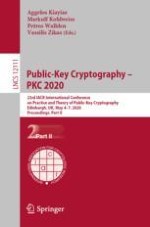2020 | OriginalPaper | Chapter
MPSign: A Signature from Small-Secret Middle-Product Learning with Errors
Authors : Shi Bai, Dipayan Das, Ryo Hiromasa, Miruna Rosca, Amin Sakzad, Damien Stehlé, Ron Steinfeld, Zhenfei Zhang
Published in: Public-Key Cryptography – PKC 2020
Publisher: Springer International Publishing
Activate our intelligent search to find suitable subject content or patents.
Select sections of text to find matching patents with Artificial Intelligence. powered by
Select sections of text to find additional relevant content using AI-assisted search. powered by
